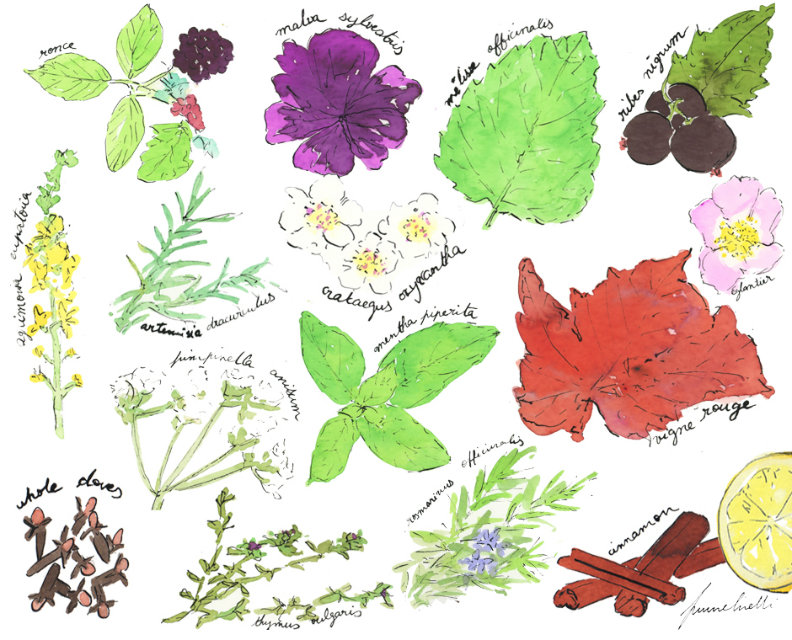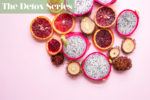Winter Herbal Teas
The herbal teas or infusions that are presented here are easy to prepare and will help you spend a healthy winter.
It’s cold outside, and we all want to sit by the fireplace with a good herbal tea.
The herbal teas or infusions that are presented here are easy to prepare and will help you spend a healthy winter.
Anti-sore throat tea
If you feel that you are getting a sore throat and if you feel like there are a thousand little needles planted in the back of your mouth when you are trying to swallow, here is a BRAMBLE herbal tea for you.
INFORMATION
Bramble (Blackberry bush) is a strong anti-inflammatory for your ear, nose and throat region. It also has an anti-infective effect on the throat. It is an astringent that limits the painful secretions. You can get it in herbalist’s shops, but for those who live in the countryside, it is a common invasive plant that is easy to find in your garden. Make sure to use the upper leaves only to avoid any contamination via animal waste.
Preparation
1 tsp of bramble leaves per cup. Pour hot water on the leaves and let steep for 10 to 15 minutes before you filter the brew. Drink up to 3 cups a day for as long as your throat hurts.
In order to enhance the anti-inflammatory and anti-infective properties of this tea, you may add some Mallow flowers (Malva sylvestris) which have a soothing effect for the throat (available in pharmacies).
If you have a fever and if your throat feels very painful, add a few cloves since they have a numbing effect. Be careful though, cloves have a tendency to reinforce the neurovegetative unbalance that triggers sore throat. Never ingest it by itself, but always accompanied by bramble, making sure there is more bramble than cloves in order to counteract the effect. Last, use the cloves on a short-term basis.
This miracle brew is delicious to the taste and can be consumed all winter long.
Anti-coughing tea
Miracle brew made with 7 flowers for a dry and loose cough
Mallow flowers (Malva sylvetris)
Marshmallow flowers (Athaea officinalis)
Cat’s foot flowers (Gnaphalium dioicum)
Mullein flowers (Verbascum thapsus)
Coltsfoot flowers (Tussilago farfara)
Red poppy flowers (Papaver rhoeas)
Speedwell flowers (Véronica officinalis)
Your herbalist’s shop will prepare this mix of flowers.
Preparation
Mix the flowers in equal quantities. Use a full teaspoon per cup, let steep for 10 to 15 minutes before you filter the brew. Drink from 1 to 5 cups per day, depending on your cough. 3 cups a day are generally sufficient.
You may also prepare 1 liter of the infusion in advance with a handful of mixed flowers and drink throughout the day.
It is a very efficient herbal tea, which soothes the airways and allows lung drainage. It has a slight sedative effect, and it also helps fight infections. This herbal tea is delicious to the taste and can be consumed all winter long. It is also highly recommended for singers because it enhances the respiratory capacity.
If you develop a fever, it is important to drink a lot, especially specific herbal teas that have the capacity to optimize your immune system.
Anti-fever tea
Fever leads to dehydration. If you develop a fever, it is important to drink a lot, especially specific herbal teas that have the capacity to optimize your immune system.
Blackcurrant leaves (Ribes nigrum) support the adrenal glands, therefore they protect your immune system. Agrimony leaves (Agrimonia eupatoria) are a very efficient antiviral that regulates fever.
You may add a few ginger root slices to this infusion in order to reinforce the anti-fever effect and enhance the immune system.
Anti gastrointestinal disorder tea
Winter usually brings along an epidemic of gastrointestinal disorders.
Prepare an infusion made with agrimony leaves or flowers, and drink daily. This plant is a powerful antiviral and antidiarrheic. It heals the mucous membranes; it fights against esophageal spasms and regulates the liver and pancreatic secretions. Use wisely and in reasonable amounts, since an excess of it could trigger convulsions. You may drink up to 1 liter per day.
If you also suffer from esophageal spasms, you may add some lemon balm leaves (Melissa officinalis) or tarragon leaves (Artemisia dracurculus).
Anti cold tea
If you suffer from poor circulation (cold hands and feet) because of the cold weather, some herbal combinations might help you.
Prepare red vine and blackcurrant leaves along with some wild rose flowers. Steep a handful of leaves in 1 liter of water for 10 to 15 minutes, and drink for a day.
After-party tea
The holiday season leads to excess in food intake, and you might want to prepare an infusion of fumitory leaves (Fumaria officinalis) which has the ability to drain the pancreas and the bile.
You may add some Lemon balm (Melissa officinalis), since it helps fight esophageal spasms. You can also add some hawthorn (Crataegus oxyacantha) to reinforce this action.
Mint (Mentha piperita) alone is sometimes sufficient. Think about preparing a mint leaf infusion the morning after having eaten a heavy meal. You can add a little bit of aniseed (Pimpinella anisum).
During the winter, make sure to drink a thyme leaf infusion in the morning. It is very efficient in fighting infections.
Preventive herbal tea
During the winter, make sure to drink a thyme leaf (Thymus vulgaris) infusion in the morning. It is very efficient in fighting infections, and it also provides a necessary boost in the morning.
However, you might want to avoid it if you suffer from hypertension or glaucoma.
In the evening, you might choose to prepare an infusion of rosemary leaves (Rosmarinus officinalis) which protect from the various winter colds and infections, and moreover helps with sleep at night.
Do not forget the decoctions of lemons, to which you can add cinnamon (sticks or powder). Bring 1 liter of water to a boil with a full organic lemon (rind included since the rind is where the essential oils reside) for 10 minutes along with 2 sticks of cinnamon. Mash the lemon with a fork in the water, filter and drink as hot as possible.
Cinnamon is an excellent tonic, with antibacterial, antiviral properties that protect you from winter infections.
Marie-Laure de Clermont-Tonnerre is a journalist and author.
«La médecine personnalisée, retrouver et garder la santé» (Odile Jacob) was published in March 2012 after two years of investigation and research with general practitioner Dr. Jean-Claude Lapraz.
«Se soigner toute l’année au Naturel» (Prat) was published in 2012 and has sold over 250 000 copies. Her latest book «Etre en Bonne santé toute l’année : 20 cures alimentaires» was launched in April 2015.






